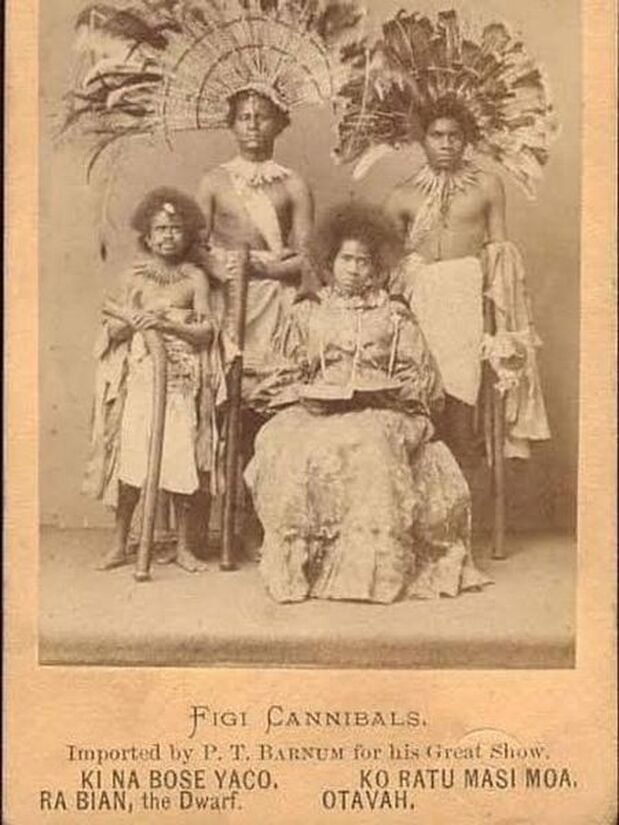Fijileaks: We would go further. Indian Indentured labour system had been in operation since 1834 (starting in Mauritius). If the i-Taukei Fijian chiefs had not ceded Fiji to Great Britain in 1874, there would not have been coolies in Fiji.
*Yes, Sashi Kiran and Shamima Ali and Sitiveni Rabuka's new-found coalition partner, girmitiya BIMAN PRASAD, are right to claim that Girmityas will always be indebted to the Vanua of Noco for their courage, care & concern in saving 'our ancestors'. We agree with the sentiments.
*They were able to do so, for, since 1879, the villagers had been left alone while shiploads of coolies kept being brought to Fiji to toil the sugar, cotton, tea and copra plantations from 1879 to 1920. The Syria carrying indentured labourers
was wrecked on Nasilai Reef on 11 May 1884.
* During the Middle Passage, hundreds of coolies who died on board were thrown overboard to be feasted by marauding sharks in the Kala Panis - Black Waters.
* The white planters, including those in Fiji, were screaming:
'Give me a coolie, and I will make a million hogs of sugar'.
*One of the most powerful chiefs in Fiji was seen as only fit to be
a white man's gardener.
* The self-styled 'King of Fiji', Ratu Seru Cakobau, who signed the Deed of Cession (no western i-taukei chiefs are signatories) subjugated the i-taukei to British control by calling on them to 'exercise a watchful control over the welfare of his children and people, and who, having survived the barbaric law and age, are now submitting themselves under Her Majesty's rule to civilization'.
*For the next 90 years, the British kept the races apart - she united to
rule and divided to exploit.
*The Europeans forged alliances with the i-taukei leaders, lying to them that '99% of the Europeans are loyalists and the handing over of Fiji to evil-smelling, treacherous, non-educated, garlic-eating Indians would be one of the greatest crimes in the history of the British Empire'.
*No wonder, in 1987, when the Indo-Fijians woke up to share political power with an i-taukei Fijian Prime Minister, Dr Timoci Bavadra, BIMAN PRASAD'S Brown Overseer, one SITIVENI RABUKA, instead of whips, stormed Parliament with guns, and ended the descendants of coolies march from Plantation to Parliament - on 14 May 1987, one hundred and eight years to the day the first coolies, on Leonidas, were introduced on the sugar plantations.
*Like Europeans before him, Rabuka described Indo-Fijians in a very similar language - they smelled differently, and Hindus and Muslims are pagans who must be converted to Christianity, for otherwise, i-taukei would become pagans. He wanted them to return to India or live as second class coolies - which he made them in his racist 1990 Constitution, from 1990 to 1999.
*Thankfully, Rabuka and his coolie political girmitiya JAI RAM REDDY, were chased out by the VOTERS in the 1999 election. They had read it correctly that the Rabuka-Reddy 1997 Constitution had been crafted so that these two,
master-servant could let Rabuka continue to rule Fiji.
*For Indo-Fijians the Rabuka coup ousted their MPs on 14 May 1987. Their history, however, will record that their own displacement from British India prevented the dispossession of the i-Taukei Fiji in colonial Fiji. Indeed, ironically, the indentured Indian was uprooted specifically to prevent the disintegration of the Fijian way of life.
*In June1978, Dr Satendra Nandan, then a Lecturer in English at USP, reminded the NFP Convention on 'The Fiji Indian- a complex fate. Legacy of Indenture':
'Whatever one may say of the material condition of the Indian villages, it was not totally deprived for each little, obscure hamlet had an enduring sense of community, sustained by generations of living together, though sometimes amidst abject circumstances. Above all, the Indian's affinity with the land was as mystical as anyone else's anywhere in the world: he always had a sense of belongingness, and frequently a sense of self-sufficiency, Both were necessary for his self-respect. In the indenture system, they were caught in a hierarchy of power designed to extract the maximum labour from its victims, no matter what the cost in human terms...Besides, they had little opportunity to establish emotional ties with the land they tilled on which many of their children and 'jahajis' were being buried; they were deliberately kept from reaching out to the indigenous people because people in authority saw it as a threat to their monopoly of freedom and monopoly of power.
*Fortunately, Fiji's history saved it from disaster. In here the system came almost 50 years after its inception; it came in a unique historical context; the impact of colonialism was never fully felt in all its barbarity in the South Pacific. The Aborigine had borne the brunt of it; the Maori had attempted to resist it. The European imagination was stirred by the images of the Nobel Savage in the Garden of Eden. Fiji itself was ceded, not conquered. Its indigenous people were not totally decimated (despite the introduction of measles which killed thousands) as had happened in many other colonial territories. What of future speculation. To quote Nandan at the NFP Convention:
"Indeed by a happy irony, the indentured Indian was uprooted specifically to prevent the Fijian way of life from disintegrating. It is interesting to speculate if this peasant labourer had not come to Fiji at a critical time, not only the Fijian way of life but many island communities in the South Pacific would have been disrupted and perhaps permanently disclosed. The planters needed labour, the government wanted economic viability for political stability, and it is anyone's guess what they would have done to achieve this. Thus the displacement of the Indian prevented the dispossession of the Fijian (i-Taukei). This may be the lasting and most significant contribution of the peasants from India. Without this the Fijian (i-Taukei) might have lost much of his land, and more tragically his self-respect."



